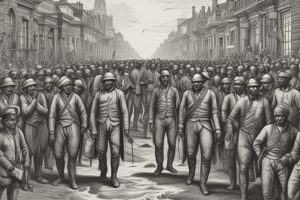Podcast
Questions and Answers
What did abolitionists believe in?
What did abolitionists believe in?
- The removal of slavery (correct)
- The prioritization of individuality
- Equal rights for all individuals
- The continuation of slavery
Who pioneered transcendentalism?
Who pioneered transcendentalism?
Ralph Waldo Emerson
The Seneca Falls Convention was the first national women's rights convention.
The Seneca Falls Convention was the first national women's rights convention.
True (A)
What was the goal of Protestant Revivalism?
What was the goal of Protestant Revivalism?
Who published the anti-slavery journal The Liberator?
Who published the anti-slavery journal The Liberator?
What was Elizabeth Cady Stanton known for?
What was Elizabeth Cady Stanton known for?
Who is considered the first professional evangelist?
Who is considered the first professional evangelist?
What is the significance of Harriet Beecher Stowe's work?
What is the significance of Harriet Beecher Stowe's work?
What was the Temperance Crusade?
What was the Temperance Crusade?
What was Henry David Thoreau's stance on government?
What was Henry David Thoreau's stance on government?
Flashcards are hidden until you start studying
Study Notes
Abolitionists
- Advocated for the eradication of slavery in the United States
- Played a crucial role in the anti-slavery movement throughout the 19th century
Transcendentalism
- A philosophical movement led by Ralph Waldo Emerson in the 1830s and 1840s
- Emphasized individuality, emotional experience, and a deep connection to nature
- Rejected traditional authority and believed in inherent goodness
Seneca Falls Convention
- Marked the first national women's rights convention in 1848
- Featured the writing of the Declaration of Sentiments, which outlined women's grievances and demands for equality
Protestant Revivalism
- Triggered by the Second Great Awakening, promoting social reform
- Instilled the idea that personal salvation was accessible through individual effort
- Encouraged a new wave of religious enthusiasm and activism
William Lloyd Garrison
- Prominent American abolitionist known for publishing "The Liberator," an anti-slavery journal from 1831 to 1865
- Viewed as an extremist for his radical views on immediate emancipation
Elizabeth Cady Stanton
- Key figure in the women's rights movement starting in 1840
- Advocated for women's suffrage and played a significant role in organizing the Seneca Falls Convention
- Co-authored the Declaration of Sentiments, demanding equal rights for women
Charles Grandison Finney
- A leading figure in the religious revival movement of the early 19th century, known for his passionate sermons
- Often referred to as the first professional evangelist
- Strong advocate for abolition and social reforms
Harriet Beecher Stowe
- Author of "Uncle Tom's Cabin," a pivotal novel that depicted the harsh realities of slavery
- Her work galvanized the abolitionist movement and sparked widespread anti-slavery sentiment
Temperance Crusade
- Movement aimed at reducing or prohibiting alcohol consumption in the 19th century
- Strongly supported by women and advocated by various social reformers, emphasizing public health and moral improvement
Henry David Thoreau
- American transcendentalist known for his critiques of government, particularly regarding slavery
- Wrote "Walden," reflecting on simple living in natural surroundings, expressing his philosophy of self-reliance
- Originated the concept of civil disobedience by refusing to pay taxes in protest of the Mexican-American War and slavery
Studying That Suits You
Use AI to generate personalized quizzes and flashcards to suit your learning preferences.




